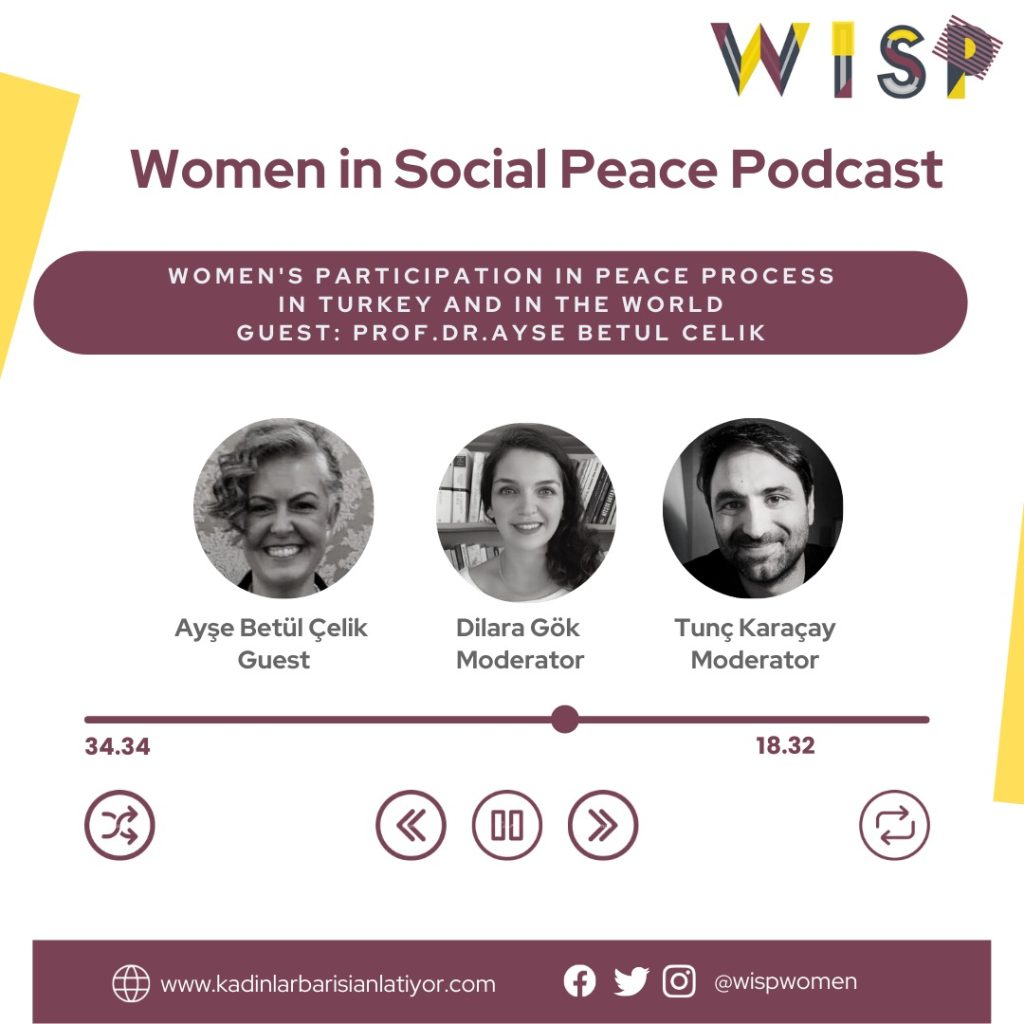We interviewed the Women in Social Peace Project team and how they aim to support women from the perspective of conflict transformation and peacebuilding, through training and podcasts.

Begüm Zorlu
This week we had a chance to talk with the Women in Social Peace project team, Dilan Kaya, Dilara Gök, Pınar Çetin, and Tunç Karaçay on their timely project that aims to contribute to the empowerment of women in their coexistence and dialogue development processes. You may have heard of them through their in-depth podcasts.
The team has experience in working on conflict resolution, peacebuilding, women’s rights, and participation with different civil society organizations in Turkey. Their work focuses on empowerment and awareness activities, and develops training workshops with different groups on the peaceful resolution of social conflicts in the long term.
Apart from their Conflict Transformation and Peace Building Trainings, the project created an audio platform through their podcasts that is accessible to all. The podcasts provide a platform where the experiences and stories of women mediators from Turkey and around the world are heard. So far, the episodes have focused on negotiations for peace in Cyprus, hosted Muna Luqman who is a peace activist from Yemen and provided also a theoretical examination of peace processes along with other cases.
We directed our questions to the WISP team on their aim to make a contribution to social peace and dialogue in the long term.
Can you tell us a bit more about the aims of your project? You give voice to the stories of people working on peace from all over the world, both in theory and in practice, with a gender perspective. How do you think this process of knowledge sharing can contribute to peace building in Turkey?
Our project aims to contribute to peacebuilding processes in general. More broadly, the WISP Project aims to support women on the areas of conflict transformation and peacebuilding through workshops and podcasts. We can say that it aims to contribute to the strengthening of the processes of coexistence and dialogue.
We can say that our project has two sections. Firstly, we conduct conflict transformation and peace building workshops with a gender perspective with women, in Mardin, Adana and Izmir. In these workshops, we tried to theoretically discuss the ongoing peace processes in the world and where women’s participation stands and its effects. However, as women from Turkey, we discussed what peace means to us, what we can do for it and the processes we go through when we think about our own country and the places we live in. We think this is also very valuable.
We believe that it would be appropriate to take steps knowing the theoretical backgrounds of these processes based on historical examples and then to talk about their reflections in our own lives and how they can be put into practice.
In addition, as stated in the question, we talked with women in different countries around the world that are involved in peace studies or directly involved in peace processes and we publish them as podcasts. What we want to do here is to share with the audience how women in different countries and cultures approach the peace processes and how they try to be involved. At this point, we think it is very valuable to share different peace perspectives and experiences.
Your work specifically focuses on gender and peace. In your view, how can a gender perspective contribute to the realization of peace processes ?
In order for peace to be realized and deepened, in other words, for it to become permanent, certain conditions must be met. We also talk about this in our trainings. Peace is not the absence of war. Social justice, participation and peaceful relations must be established in peace-building processes to ensure positive, lasting peace. At this point, the gender perspective gains great importance. As many of our guests invited to our podcast recordings have said, and as we know from historical examples, women are affected by wars differently. In addition, it has been observed that women are more aware of both their own grievances and the grievances of other disadvantaged groups, and therefore they think about more inclusive solutions. Even for this basic reason alone, it is important that women’s perspectives are on the table. Moreover, it is men who actually initiate and conduct the war. Therefore, it would not make much sense to seek peace at a table consisting only of men. And for positive transformation to continue, everyone affected by a devastating conflict must be involved in the peacebuilding process. In this case, we can say that women’s involvement in the peacebuilding process is not a choice but a necessity. Along with this reality, it is a well-known fact that the differences in women’s perspectives contribute more positively to the peace processes. The research published by the United Nations Women’s Unit (UNWOMEN) in 2018 examined the participation of women in peace processes in the world between 1990 and 2017. As a result of this review, it was stated that when women are included in peace processes, there is a 35% increase in the probability of an agreement that will last at least 15 years.
In short, addressing peace processes with a gender perspective is essential for achieving lasting peace.
Notes
- You can subscribe to their podcast channel from this link.
- The WISP project is funded by AEIF 2021 fund.

